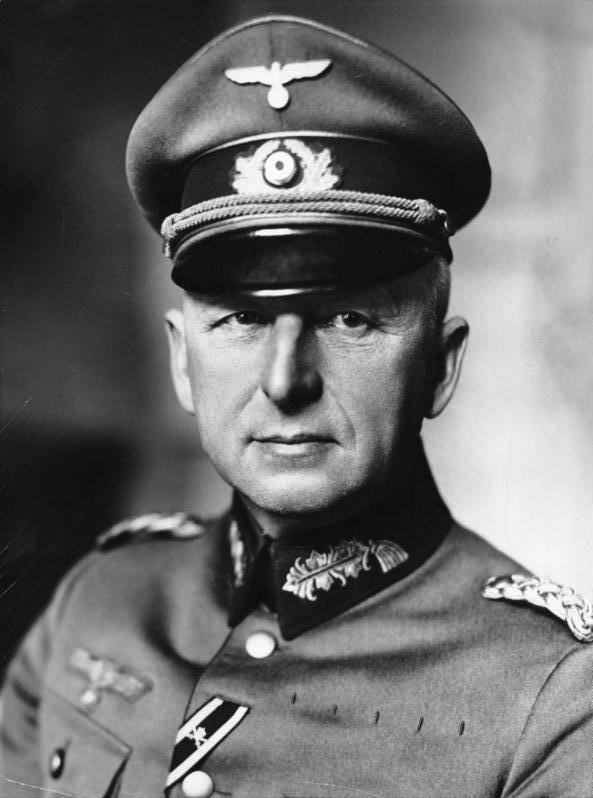|
|
Post by Ivan Kolev on Sept 12, 2016 23:09:29 GMT
In this presentation, we will talk about the Hungarian leader Miklós Worthy de Nagybánya. 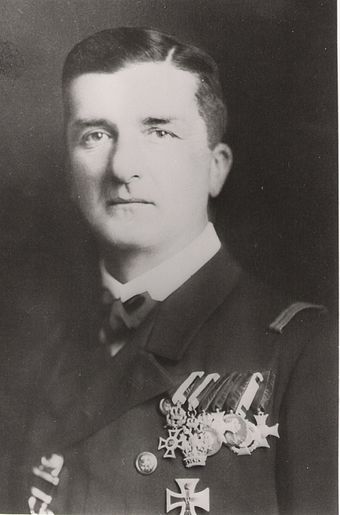 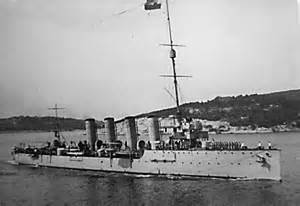 Top: Miklós Horthy de Nagybánya in the First World War. Top: Miklós Horthy de Nagybánya in the First World War.
Bottom: The SMS Novara
Miklós Horthy de Nagybánya was born in Kenderes, Hungary, on June 18th, 1868, to a wealthy noble family. Horthy entered the Austro-Hungarian naval academy at Fiume, Croatia (Now called Rijeka) in 1882 at just 14. The language of instruction at the academy was German, resulting in Horthy having a distinct German accent when speaking Hungarian. He also spoke Italian, Croatian, French and English besides German and Hungarian. Following his exit from the naval academy, Horthy served as the Austro-Hungarian diplomat to the Ottoman Empire until 1911, when Emperor Franz Joseph made him a naval advisor, a position he would retain until the start of World War One. When World War One began, Horthy was made commander of the pre-Dreadnought SMS Habsburg, but would change ships multiple times, performing bold attacks while serving on the SMS Novara in 1915. In 1917, he planned for an assault on the Otranto Barrage, which he participated in. The Battle of the Strait of Otranto resulted due to the planned raid, with Italian, British and French ships consolidated against the Austrian force. The Austro-Hungarian ships won a major victory against the Entente, with their ships receiving little to no damage. Horthy was injured as a result of the battle, however. Horthy was made the commander in chief of the Imperial Austro-Hungarian navy following the Cattaro Mutiny in February which saw a large naval mutiny, including much of the empire's senior naval figures. Horthy attempted another raid on Otranto in June of 1918, but after the SMS Svent István was sunk by an Italian submarine during the night before the raid, Horthy decided to call off the attack. For the rest of the war, Horthy was able to preserve the Austro-Hungarian navy, but following the Austro-Hungarian surrender to the Entente in October of 1918, Emperor Charles ordered Horthy to surrender the fleet to the new State of Slovenes, Croats and Serbs on October 31st. After the war, Miklós Horthy gave his farewell to former Emperor Charles and then left for Hungary. The new Hungarian government, which didn't have a coastline as a result of the Treaty of Trianon, had no need for an admiral, so Horthy decided to go into retirement with his family. The Hungary he has returned to, however, is vastly different than what he used to know. |
|
|
|
Post by Ivan Kolev on Sept 12, 2016 23:48:53 GMT
 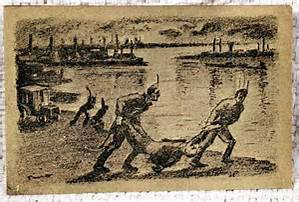  Top: Pál Prónay Top: Pál Prónay
Middle: Jewish victim of the White Terror being carried by two Hungarians.
Bottom: Béla Kun delivering a speech in Budapest.
"The atrocities of the Bolshevists filled the land with horror. Their agitators penetrated even into our hitherto peaceful district. The peasants were terrorized by groups of men who went from village to village, held courts martial, and with sadistic pleasure hanged all those who in the war had been awarded the gold medal for bravery... The Jews who had long been settled among us were the first to reprobate the crimes of their co-religionists, in whose hands the new regime almost exclusively rested."
-Miklós Horthy regarding the Red Terror in his memoirs
At the end of World War One, Hungary was thrown into turmoil, and chaos ensued. The Treaty of Trianon, meant to deal with Hungary, resulted in the cession of multiple formerly Hungarian territories to countries such as Romania, the State of Slovenes, Croats and Serbs (Later Yugoslavia) and Czechoslovakia, resulting in a third of all Hungarian speakers living outside of Hungary. In March of 1919, communist revolutionary Béla Kun took power in Budapest and established the Hungarian Soviet Republic. This republic would then go to war with Romania in order to retake Transylvania. The war resulted in Hungary being thrown into conflict with all of its neighbors except Austria, and Hungary began losing badly. As a result, Kun's popularity plummeted, and word of a counter-revolution against him began to spread. In order to repress any treasonous thought, Kun's government began the Red Terror, where armed gangs sent by the Hungarian government would beat or kill enemies of the regime, even if the targets had no thoughts of overthrow. On May 30th, 1919, reactionaries in the Hungarian town of Szeged, currently occupied by the French, organized a counter-revolutionary group, with its leader being Gyula Károlyi. Károlyi reached out to Horthy, asking him to become head of the National Army, the military arm of the group. Horthy consented, being staunchly opposed to communism, and arrived in the town soon after. The communists in Budapest ultimately fled by August, and on the 6th of that month, the Romanian military entered Budapest. Following the Romanian capture of the city, members of the counter-revolutionary group began what would become the two year long White Terror. The White Terror was in response to the Red Terror initiated by the communists, and was aimed towards communists, leftists and Jews. The communist government was primarily run by young Jews, which is why the Hungarian reactionaries targeted the Jews, despite the majority of Hungarian Jews being opposed to Kun's regime. Most of the killings were done by a divisional commander of the National Army, named Pál Prónay, who was a massive anti-semite. He led a battalion himself called the Pronay Battalion, aimed at killing as many Jews or communists as physically possible. Prónay at one point even planned for a massive pogrom of the Jews in Budapest before Horthy ordered against it. It is unknown how much Horthy actually knew of the atrocities committed by his military subordinates, but most sources state that while Horthy never actively participated in any atrocities, he did tacitly support battalions such as the Pronay Battalion. It is unknown as to how many died in the White Terror, and the terror didn't end until 1921. Pál Prónay was imprisoned for a brief period of time before being released. Prónay would later become a member of the Hungarian fascist party called the Arrow Cross Party and would end up fighting for the Nazis in the Battle of Budapest in 1944-1945. Kun's short lived communist regime would have a major effect on Hungarian politics during the Interbellum period and the Second World War, mainly with the result of Hungarian policy being strictly anti-communist. Miklós Horthy would be the one of main proponents of this policy. |
|
|
|
Post by Ivan Kolev on Sept 13, 2016 20:15:31 GMT
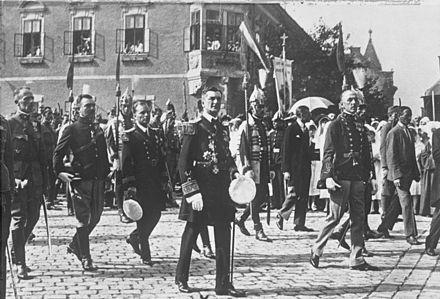 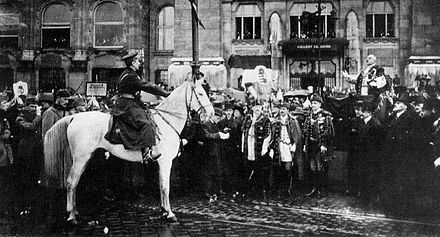 Top: Horthy in Budapest in August of 1931 Top: Horthy in Budapest in August of 1931
Bottom: Horthy leading the National Army into Budapest. Horthy would then deliver a speech in the city accusing the citizens of Budapest of treason by support Bolshevism.
"Hungary's Parliament has elected you Regent! Would it please you to accept the office of Regent of Hungary?" -Bishop Ottokár Prohásvka telling Miklós Horthy he has been elected regent of HungaryOn February 25th, 1920, the Romanian military left Budapest under pressure from the Entente, and the new Hungarian government established itself in Budapest. The new Hungary was a monarchy, but because the Entente would not allow Charles I, the former Emperor of Austria and therefore the King of Hungary, to retake the throne of Hungary, a regent was needed to fill in for him. The Hungarian parliament voted Miklós Horthy in as regent, the vote being 131-7 in favor of him. Bishop Ottokár Prohávska delivered the news to Horthy, but Horthy declined, demanding that he be given more power as regent. Hungary was actually a constitutional monarchy before Horthy's reign, with the Regent/King having little power. The parliament agreed to give Horthy more power as regent, and Horthy accepted. Among Horthy's powers included that Horthy could veto any proposed legislation which he didn't agree with, meaning that every piece of legislation had to conform to his ideology or guideline. While Horthy himself wan't involved in proposing and creating legislation himself, he did make sure any legislature he didn't like didn't get passed. He could also appoint or dismiss prime ministers and dissolve parliament when he deemed necessary. Charles I did attempt to retake the Hungarian throne after Horthy became head of the country, but Horthy was able to ensure that he didn't retake the throne. For the rest of the 1920's, Horthy focused on stabilizing the economy and consolidating his reign. Horthy was able to accomplish these goals with aid of his personally appointed prime minister, István Bethlen. Bethlen was able to stabilize the economy while also establishing alliances with smaller countries who could help reverse the Treaty of Trianon. The economic stabilization of the country was also aided by British political and economic support. Important to mention here that Horthy was a major Anglophile, admiring them for their navy and economical success. Horthy's and Bethlen's policies worked well for the rest of the decade, but when the Stock Market Crash of 1929 resulted in the Great Depression, Hungary would be thrown onto a radically different course. More on that next time. |
|
|
|
Post by Ivan Kolev on Sept 13, 2016 23:52:31 GMT
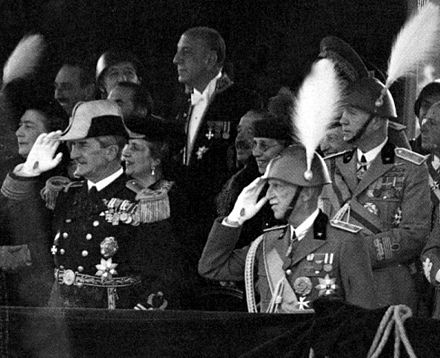  Top: Miklós Horthy with King Victor Emmanuel III of Italy in Rome Top: Miklós Horthy with King Victor Emmanuel III of Italy in Rome
Bottom: Gyula Gömbös
"Nem, nem soha!"
-Hungarian Nationalist phrase going against the Treaty of Trianon meaning "No, no never!"
Hungarian foreign policy after World War One was centered a lot on irredentism, or in other words, trying to retake lands that were deemed ethnically Hungarian. The Hungarians wanted to retake parts of Slovakia, Transylvania, Vojvodina and Croatia. The people were incredibly nationalistic and hated the terms of the Treaty of Trianon. When a British newspaper denounced the Treaty of Trianon in an issue in 1927, 1.2 million Hungarians signed a letter of gratitude to the newspaper publisher. The government was also extremely anti-communist ever since Béla Kun's communist revolution. These ideologically put them aligned with countries such as Mussolini's Italy and, after 1933, Hitler's Germany. The event which ultimately made the fates of Hitler's Germany and Horthy's Hungary intertwined, however, was the Great Depression. Hungary was hit hard by the Depression, with the economic progress of the 1920's being totally erased. Horthy decided to fire Bethlen and instead replaced him with Gyula Gömbös. Gömbös was a fascist and an outspoken anti-semite, but Horthy ensured that he hold back his anti-Semitic thoughts and to deal with the Jewish politicians in Budapest. Gömbös made Hungary more ideologically rightward towards a Fascist regime. He strengthened Hungarian ties with Mussolini and with Hitler when he took power. Gömbös was able to relieve much of the economic stress placed upon Hungary by the Depression by making trade agreements with Nazi Germany. These trade deals resulted in Hungary becoming economically dependent on the Nazi regime, meaning that if Hungary were to ever go against Germany, they would be economically ruined. The trade deals by Gömbös intertwined Hungary's fate with that of Germany's, beginning the alliance between Horthy and Hitler. Horthy himself was skeptical of Hitler, and was much more aligned with Britain (Remember that he was an Anglophile), but Horthy came to become an acquaintance of Hitler, coming to review and inspect German ships. Horthy saw Hitler's Germany as a bulwark against the communist threat of the Soviet Union. Horthy was incredibly anti-communist, an American diplomat referring to it as a phobia. Near the beginning of World War II, however, Hitler would begin exerting influence over Hungary and forcing them to pass certain laws and acts; Many of which involving the Hungarian Jews. More on that next time. |
|
|
|
Post by Quintus Fabius on Sept 14, 2016 0:07:38 GMT
|
|
|
|
Post by Ivan Kolev on Sept 14, 2016 0:10:46 GMT
Fixed, thanks for telling me. I'm kinda tired during the week so I tend to make more grammatical and silly mistakes (The grammatical mistakes definitely make me feel dishonor  ) I'd love to have an actual quote description that event or the letter itself. I'm not sure if i'd mention it on its own. |
|
|
|
Post by Quintus Fabius on Sept 14, 2016 0:14:50 GMT
Fixed, thanks for telling me. I'm kinda tired during the week so I tend to make more grammatical and silly mistakes (The grammatical mistakes definitely make me feel dishonor  ) I'd love to have an actual quote description that event or the letter itself. I'm not sure if i'd mention it on its own. That quote is more likely a urban legend, of course, but the facts (Horthy having a negliable navy [as in small ships that basically guarded the Danubean Border], even though he was an admiral, and no king in the 'Kingdom of Hungary' [the allies refused to let him in]) are true. |
|
|
|
Post by Napoleon Bonaparte on Sept 14, 2016 6:20:38 GMT
All great, but your autocorrect makes Horthy as Worthy, I've seen it in the first post of yours and the third as well. Please correct it.  |
|
|
|
Post by Ivan Kolev on Sept 14, 2016 10:23:11 GMT
All great, but your autocorrect makes Horthy as Worthy, I've seen it in the first post of yours and the third as well. Please correct it.  It's almost impossible to avoid that when I post it, because it will auto-correct after every single time I type it in. I can fix it, just know that there is always going to be that typo. EDIT: Fixed now btw  |
|
|
|
Post by Frederick the Great on Sept 14, 2016 12:17:56 GMT
Will you be adding more or is it done? I'm quite interested and would like to know more.
|
|
|
|
Post by Ivan Kolev on Sept 14, 2016 18:01:50 GMT
Will you be adding more or is it done? I'm quite interested and would like to know more. It's only just begun, my friend  Horthy allying with Hitler is really the event which starts making things really interesting. i expect to make at least two presentations today, and they will continue until I cover Horthy's death. Glad to know you're liking it  |
|
|
|
Post by Ivan Kolev on Sept 14, 2016 19:01:49 GMT
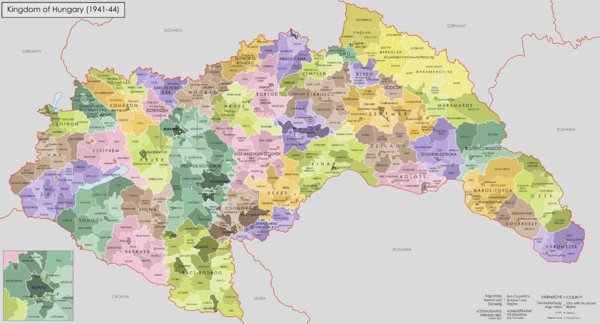 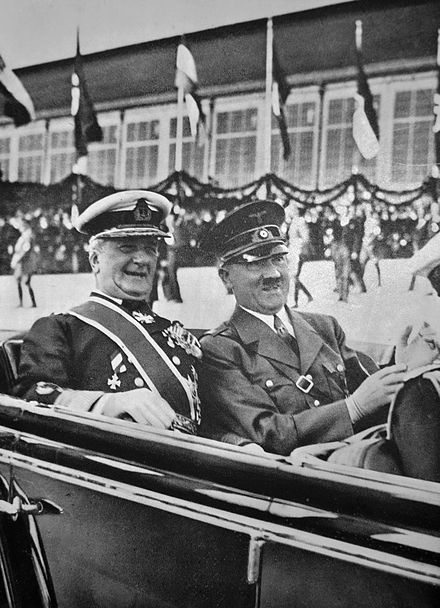  Top: Hungarian territory as of 1941. Top: Hungarian territory as of 1941.
Middle: Horthy with Adolf Hitler in 1938.
Bottom: Horthy meeting a crowd of Hungarians in Carpatho-Ukraine.
"As regards the Jewish problem, I have been an anti-Semite throughout my life. I have never had contact with Jews. I have considered it intolerable that here in Hungary everything, every factory, bank, large fortune, business, theatre, press, commerce, etc. should be in Jewish hands, and that the Jew should be the image reflected of Hungary, especially abroad. Since, however, one of the most important tasks of the government is to raise the standard of living, i.e., we have to acquire wealth, it is impossible, in a year or two, to replace the Jews, who have everything in their hands, and to replace them with incompetent, unworthy, mostly big-mouthed elements, for we should become bankrupt. This requires a generation at least."-Miklós Horthy regarding the 'Jewish Problem' in Hungary.While Horthy was skeptical of Hitler, he tolerated an alliance with him for two main reasons: -Horthy believed the Nazi regime served as a large bulwark against the Soviets, who were seen an eminent threat to Hungary by Horthy. -German aid could help in Hungarian ambitions to retake territory that was lost after the Treaty of Trianon. A Magyar-German alliance seemed especially logical as Czechoslovakia, Yugoslavia and Romania were all French aligned or French allies. Horthy did have doubts that Hitler's regime could win a war against Britain, however, as he believed British sea power would ultimately prove victorious against a German enemy. Horthy even expressed this doubt to Hitler himself in 1935, when Hitler expressed to Horthy that he was planning to partition Czechoslovakia between Germany and Hungary. While Horthy was pleased with the idea of partitioning Czechoslovakia, he did caution Hitler not to try and start a World War against Britain. This doubt by Horthy that Germany would be able to win a war against Britain, which would ultimately be the Second World War, would linger for the rest of his reign and alliance with Hitler. In August 1938, Horthy went on an official state visit to Germany, notably meeting Hitler and christening the German war ship Prinz Eugen. During his state visit, Hitler requested that Horthy provide men and material for the German invasion of Czechoslovakia, stating that whatever land the Hungarians occupy on their own will be theirs in the peace deal. Horthy declined, instead wanting to regain the lost territories through peaceful means and not through war. Three months after the state visit, the Munich Agreement was signed, giving the Sudetenland to the Germans. After the Munich Agreement, the First Vienna Award was signed, which was proposed by the Germans and resulted in the cession of much of Southern Slovakia and Carpatho-Ukraine to Hungary. Territorial disputes with the Nazi puppet state of Slovakia, however, resulted in the Slovak-Hungarian War in 1939, which ultimately resulted in the cession of even more Slovak land to Hungary. In August of 1940, the Second Vienna Award was signed, which, after failed Hungarian-Romanian negotiations about the issue, forced Romania to cede Northern Transylvania to Hungary. The Hungarian government and population were incredibly happy with these Awards and came to support the Germans. These Awards were signed by the Germans in order to exert more influence over Hungary. When the Germans invaded Yugoslavia in 1941, Hungarian troops also participated in the invasion, and in return gained Vojvodina and parts of Eastern Croatia. The Germans used this influence to force the Hungarians to sign into law multiple anti-semitic laws. In 1938, the first Hungarian anti-Jewish law was signed, limiting the number of Jews working in professions, the government and commerce to twenty percent. The Second anti-Jewish law in 1939 lowered that number to five percent, and 250,000 Hungarian Jews lost their jobs as a result of these laws. The third anti-Jewish law in 1941 prohibited Jews from marrying non-Jews, and also defined anyone having two Jewish grandparents as 'racially Jewish'. A Jew caught having non-marital sex with a non-Jew could be sentenced up to three years in prison. Despite the German influence on Hungarian policy toward Jews, that influence did not affect Horthy's policy towards political groups. The Hungarian government at this point was not really fascist and more so dictatorial. He actually imprisoned the leader of the Arrow Cross Party multiple times, and American diplomats did say that Horthy's strict policy against communism also applied to fascists. Hitler did influence Horthy's diplomatic decisions quite a lot, however, persuading him to join the Anti-Comintern Pact in February of 1939 and to withdraw from the League of Nations in April of that year. When the Germans invaded Russia in Operation Barbarossa, Horthy would join them in their campaign. More on that next time. |
|
|
|
Post by Deleted on Sept 15, 2016 4:33:57 GMT
|
|
|
|
Post by Frederick the Great on Sept 15, 2016 6:37:11 GMT
Unless there was a post that's now been deleted that I haven't seen and that you were talking about, I see no reason to intervene here. |
|
|
|
Post by Napoleon Bonaparte on Sept 15, 2016 7:22:57 GMT
Guys please get back on track (insert derailed train here) as the problem has been resolved a while ago.
|
|















 )
)
 Horthy allying with Hitler is really the event which starts making things really interesting.
Horthy allying with Hitler is really the event which starts making things really interesting.




